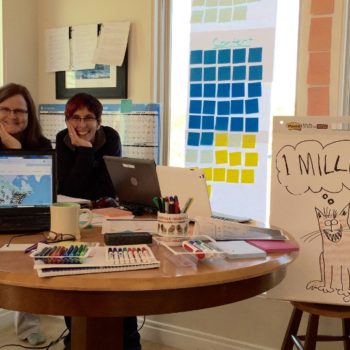The Million Cat Challenge is a partnership of Maddie’s Fund®, the UC Davis Koret Shelter Medicine Program, Maddie’s Shelter Medicine Program at the University of Florida, and the ASPCA®, formed to help shelters save the lives of 1 million more cats. It is based on five key initiatives which bring forward those approaches that have worked to increase feline lifesaving in shelters of all sizes and types.
In a series of webinars launched in 2015, Challenge co-founders Dr. Julie Levy and Dr. Kate Hurley were joined by a line-up of municipal officials, shelter directors, shelter managers and veterinarians to share experiences, lessons learned, actionable tools and tips that can be put into practice right away, along with longer-term strategies to success in saving cats’ lives. You can view all the webcasts below, as well as additional presentations on the Million Cat Challenge website.
Introducing the Million Cat Challenge
Every cat counts. That’s the premise of the Million Cat Challenge, a joint campaign of the UC Davis Koret Shelter Medicine Program and the Maddie’s® Shelter Medicine Program at the University of Florida.
Alternatives to Intake: When the Shelter Isn’t the Answer
What if your city wanted to stop euthanizing community cats in the shelter, and decided to try something bold? And what if all the animal control officers, rescue groups, and community members came together to make it work? Join Wiley Stem III, Assistant City Manager of Waco, TX, as he shares his community’s inspiring story of collaboration and lifesaving.
Managed Admission: Giving Shelter Cats Their Best Chance at a Great Outcome
Not every cat who is presented to a shelter for relinquishment is in need of immediate admission. In many cases, simply knowing that help is available and the shelter can take the cat in the near future is enough to allow the community member to opt for an appointment down the road, when his or her cat can be better cared-for by the shelter. In some cases, supportive management may buy the owner enough breathing room that the cat ends up being able to remain in the current home after all. Listen as two shelter leaders who have had great success in managed admission approaches, Barbara Carr, Executive Director of the SPCA Serving Erie County, NY, and Kathie Johnson, Senior Operations Manager of the Animal Humane Society in Minneapolis, MN., as they share what they’ve learned, including what’s worked and what hasn’t.
Return to Field: Animal Shelters and a New Approach to Healthy Unowned Cats
What can animal shelters do about healthy unowned cats in their community? One new concept increasingly gaining ground is that, as long as the cats are thriving, the most compassionate lifesaving approach is to sterilize them, vaccinate them, ear-tip them and return them where they were found. This webinar features Scott Trebatoski, Director of the Pet Resources Division of Hillsborough County, Fla.
Capacity for Care: When Less Adds Up to a Whole Lot More for Shelter Cats
How can your shelter save more cats? Take in fewer of them at a time, give each cat more room and care for them better. That concept seems counter-intuitive to a lot of people, but even those who understand that “less is more” when it comes to moving cats out into new homes struggle to understand the math. Find out how it works from Ollie Davidson, Director of Programs at Tree House Animal Shelter in Chicago, and Kathleen Olson, Executive Director of the Humane Society for Tacoma and Pierce County in Washington State.
Removing Barriers to Adoption: How Evidence, Innovation and Compassion Grow Pet Adoptions
A growing body of research is suggesting adoptions done with less intrusive methods of pet-adopter matchmaking are just as effective as, and even more successful than, those with lots of hoops to jump through. Hear Dr. Cynthia D. Delany and Kelly Lee, from a private shelter and a municipal shelter in Yolo County, CA., respectively, as they share their community’s experience with removing barriers to adoption.

